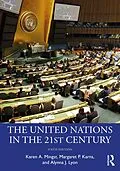The United Nations in the 21st Century, Sixth Edition, provides a comprehensive yet accessible introduction to the UN. It explores the historical, institutional, and theoretical foundations of the UN as well as major global trends and challenges facing the organization today, including changing major power dynamics, new threats to peace and security, the migration and refugee crises, the COVID-19 pandemic, and the existential challenges of climate change and sustainability.
Thoroughly revised and expanded, it contains two new chapters on the UN and the environment and on human security, including issues of health, food security, global migration, and human trafficking. There is enhanced analysis of theoretical perspectives on post-colonialism, feminist theory, constructivism, and non-Western views. New content has also been added on the UN's budget crisis, public-private partnerships, and the role of women in the organization.
By examining the UN as an intergovernmental organization facing the broader need for global cooperation to address economic, social, and environmental interdependencies alongside the threats posed by rising nationalism and populism, this popular text is the perfect reference for all students and practitioners of international organizations, global governance, and international relations.
Autorentext
Karen A. Mingst is Professor Emerita at the Patterson School of Diplomacy and International Commerce and the political science department at the University of Kentucky.
Margaret P. Karns is Professor Emerita of Political Science at the University of Dayton and Senior Fellow in global governance and human security at the University of Massachusetts Boston.
Alynna J. Lyon is Professor of Political Science and Faculty Fellow, Office of Senior Vice Provost, Engagement and Faculty Development at the University of New Hampshire.
Klappentext
The United Nations in the 21st Century, Sixth Edition, provides a comprehensive yet accessible introduction to the UN. It explores the historical, institutional, and theoretical foundations of the UN as well as major global trends and challenges facing the organization today, including changing major power dynamics, new threats to peace and security, the migration and refugee crises, the COVID-19 pandemic, and the existential challenges of climate change and sustainability.
Thoroughly revised and expanded, it contains two new chapters on the UN and the environment and on human security, including issues of health, food security, global migration, and human trafficking. There is enhanced analysis of theoretical perspectives on post-colonialism, feminist theory, constructivism, and non-Western views. New content has also been added on the UN's budget crisis, public-private partnerships, and the role of women in the organization.
By examining the UN as an intergovernmental organization facing the broader need for global cooperation to address economic, social, and environmental interdependencies alongside the threats posed by rising nationalism and populism, this popular text is the perfect reference for all students and practitioners of international organizations, global governance, and international relations.
Inhalt
1 The United Nations in World Politics
The United Nations in World Politics: Vision and Reality
Contending International Relations Theories
Dilemmas the UN Faces
Conclusion
2 The Evolution of the United Nations System
The League of Nations
The Origins of the United Nations
The Organization of the United Nations
Global Conferences and Summits
Persistent Organizational Problems and the Challenges of Reform
Conclusion
3 Actors in the United Nations System
The Role of States: The First UN
Coalitions, Blocs, and the Importance of Consensus
The Secretary-General and the UN Secretariat as Key Actors: The Second UN
Nonstate Actors: The Third UN
Conclusion
4 Maintaining International Peace and Security
Linking International Relations Theories
Maintaining Peace and Security: The UN Charter and Its Evolution
Mechanisms for Peaceful Settlement and Preventive Diplomacy
Collective Security, Enforcement, and Sanctions
Peace Operations: Peacekeeping and Peacebuilding
Humanitarian Intervention-R2P and POC-Providing Human Security
Arms Control and Disarmament
Countering Terrorism
Dilemmas the UN Faces
Conclusion
5 Economic, Human, and Sustainable Development
The Organization and Approaches of the UN System for Promoting Development
Operational Activities and Functional Divisions by Issue Areas
The UN and Evolving Ideas About Development
The UN and Other Actors
Lessons Learned
Dilemmas the UN Faces
6 Advancing International Human Rights
From the League of Nations to the United Nations
UN Charter Principles and Organizational Structures
The Role of the UN in Human Rights
The Role of Nongovernmental Organizations
The Role of Celebrities
Case Studies of the UN System in Action
Efforts to Address Genocide, Crimes Against Humanity, and War Crimes
Evaluating the UN's Human Rights Record
Dilemmas the UN Faces
7 Protection of the Environment
Genesis of an Idea: The Stockholm Conference
The Institutional Framework for Environmental Protection
Comparing UN System Initiatives on Ozone Depletion and Climate Change
Protecting Biological Diversity
Dilemmas the UN Faces
8 Human Security: Health, Food, Migration, and Trafficking
An Expanded View of Security
The UN, Health, and Human Security
The UN and Efforts to Ensure Food Security
The UN and the Refugee and Migration Crisis
Dilemmas the UN Faces
9 Is There a Future for the United Nations?
Does the UN Make a Difference?
Lessons About What the UN Cannot Do
Factors in UN Success and Failure
Can the UN Be Reformed?
Linking the UN to Global Governance
Appendix: Charter of the United Nations (Selected Sections)
